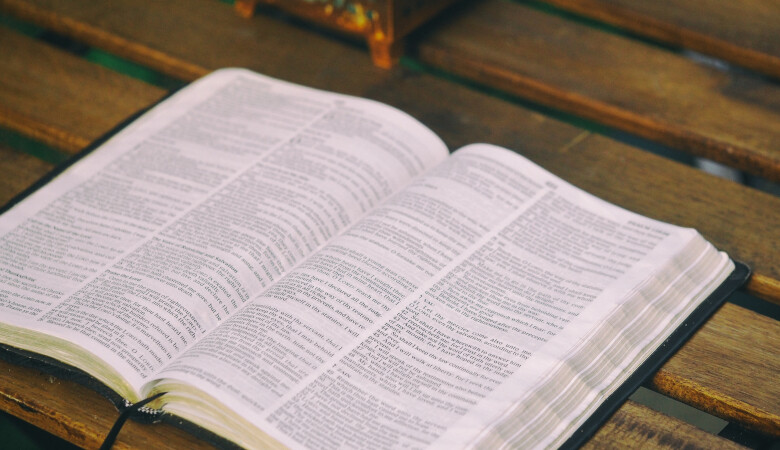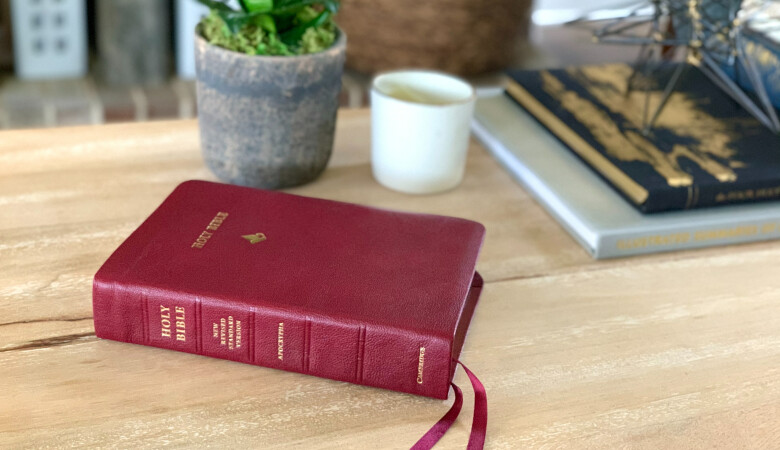The Humiliation and Exaltation of King Nebuchadnezzar (Daniel Sermon 7 of 17)
February 04, 2001 | Andy Davis
Daniel 4:1-37
Humility, Providence and Sovereignty of God
I. Human Pride: The Root of All Evils
Go to your Bibles and open to Daniel chapter 4. As we continue in our series in Daniel, we look at one of the most important chapters in the Bible. The reason I say that is because this chapter opens up what I consider to be my soul's greatest enemy, also the greatest enemy of what God wants to do in this church, and that is pride. The more I've gone on in my Christian life the more I see that as I trace back troubles in my life, it roots back to pride, time and time and time again. Everything that God wants to do in our lives, pride opposes. Everything. If you're not a Christian and I were to stand and tell you that your righteousness was like filthy rags in God's sight, there's something inside you that riles up. What is that? Well, it's pride. And if I were to tell you that you had to receive salvation as a gift paying nothing, but just receiving it simply as a gift, there's something inside you that says, no it can't be. "We are more unwilling," said a Puritan scholar, "to give up our righteousness than our sins." And why is that? Because of pride.
Alright, and then once you become a Christian, are you finished? Are you saved, you're done? No, our "salvation is nearer to us now than when we first believed," there's a journey to be traveled. "I am the way and the truth and the life, no one comes to the Father except through me," that's journey language, isn't it? And what is it that fights every step of the journey? It is pride. Because as we're advancing we're putting sin to death, we're seeing problems in our lives, they're exposed by Scripture, by good preaching, by a friend who speaks the truth to us, and there's something inside that fights. And what is it? It is pride. And so we have pride exposed and revealed in Daniel chapter 4. But we have more than that, we have the remedy and the only remedy, a sovereign God who sits on a throne and who reveals Himself in all His majesty and His splendor as a King of kings and a Lord of lords. Who rules over the kingdoms of men and over individual men no matter how powerful they are.
And so the final phrase in this chapter has become for me one of the sweetest in all the Bible, those who walk in pride He is able to humble. It's a remedy. Our God is a God who hates pride and yet deals with it so wisely, and we're going to see that today. Preaching in the year 411, St. Augustine as he was ordaining a bishop warned against pride, and he said this, he said, "Pride is a great vice, and the first of vices, the beginning, the origin, and the cause of all sins." Now stop and think about that, the beginning, the origin, the cause of all sins. It's what cast down an angel and made him into the devil. Pride was the cup which on being cast down he gave to the man still standing for him to drink. The beginning of every sin is pride, because pride is the desire to replace God with oneself.
The Story of Narcissus
There's a story told in ancient Greek mythology of Narcissus, you remember the story about Narcissus, a beautiful youth, too beautiful, too proud for anyone, couldn't find any friend or soul mates. And so one day he looked into a crystal pool and what did he see? A beautiful soul mate, himself, he fell in love with himself. By way of contrast. Do you realize that the number one tourist attraction in the United States is the Grand Canyon? Now you may wonder what in the world do those two have to do with each other? Well, let me ask you a question, how many of you have been on vacation in the last year? Go ahead, put your hands up. How many of you have spent your vacation looking at a mirror? Have you ever gone and stared at a mirror for your vacation? Don't you rather go to the ocean or the mountains or the Grand Canyon or something outside of yourself that's glorious and majestic and lifts you up out of your circumstances? And so we have a tension in our soul, we see the Narcissus, we see the mirror, the gazing inward and wanting to find all fulfillment there, and yet we're not satisfied. And so on vacation time we go to the Grand Canyon and see something majestic.
And so what is it? Well, the Grand Canyon represents that which is left in our soul of a yearning after God. We're hungry for Him, we want Him, we yearn for Him. Narcissus represents what sin has done, we try to take what was meant for God and focus inward on ourselves, we yearn for ourselves, we find the answers in ourselves, we're satisfied like Nebuchadnezzar walking on the palace roof with everything that we have accomplished. It's good enough for us. Pride. And so therefore the central lessons in Daniel 4 we need to hear very much. That God rules over the kingdoms of men and is satisfying to the soul, and that those who walk in pride He is able to humble.
II. Nebuchadnezzar Narrates the Vision (vs. 1-18)
Now, what I propose to do because it's a lengthy narrative chapter, is to go through it section by section rather than reading through it all at once, but rather to explain what happened in this chapter, so that we might understand how God worked in Nebuchadnezzar's life. Now, in verses 1 through 18 Nebuchadnezzar narrates a vision that he had. And in verse 1 through 3, the first section of this, he gives a proclamation or an address to the members of his kingdom. And this is what he says, "To the peoples, nations, and men of every language who live in all the world may you prosper greatly. It is my pleasure to tell you about the miraculous signs and wonders that the Most High God has performed for me, how great are His signs, how mighty His wonders, His kingdom is an eternal kingdom, His dominion endures from generation to generation." This is a proclamation that Nebuchadnezzar wrote. The timing of it is probably immediately after his restoration, after his mind was restored from that of an animal. And he wanted to tell everyone what God had done in his life. Earlier we heard two wonderful testimonies about what God had done in the lives of two sisters in Christ, this is Nebuchadnezzar's testimony about what God had done in his life, and he wants everyone to know about it, he's written a universal greeting.
And it's not just to the members of the Babylonian kingdom of 500 BC, it's for us today, because here it is in Scripture, it's very unusual chapter, it's the only chapter in all the Bible written by a pagan king. And yet God, through His Holy Spirit, brought it to us so that we might understand.
The Culmination of a Spiritual Journey?
Could this be the culmination of a spiritual journey for Nebuchadnezzar? Could it be that God has been working, navigating in Nebuchadnezzar's life, bringing him to a point of brokenness before God, where he's ready to accept that Heaven rules and that there is a God on the throne? Remember in Chapter 1, Nebuchadnezzar was introduced to four extraordinary Jewish youths, Daniel, Hananiah, Mishael, and Azariah. Extraordinary. He said they were 10 hands better than anyone he had found in his kingdom, 10 times better. And they spoke of a God who's the only God, the ruler above all gods, and it was the God of Israel. A bit of a puzzlement. I thought I just defeated Israel on the battlefield. How can this be? And so already the wheel is beginning to turn.
And then suddenly Daniel chapter 2, an extraordinary vision that he has, which he cannot understand. And he wants so much to know what this vision means. And he calls in all of his wise men and he says, "You must do two things. Number one, you must tell me what the dream is, and number two, you must interpret it for me." None of them could do that, it would be a miracle. I can't read your thoughts, oh, king. Nobody can do this. But God could, and He did it through his spokesman Daniel. And you remember that vision was of human history, of the expanse of the kingdoms after Nebuchadnezzar. This got Nebuchadnezzar to thinking. What is this "after Nebuchadnezzar" thing? What is this "after Babylon" problem? I thought our kingdom was the final kingdom. No, not at all. There's going to be another kingdom and then another and then another and on and on until at last a kingdom from heaven rules over all the earth. I don't like that. As a matter of fact, I'm going to set up a gold statue, gold top to bottom, not just a head of gold representing Nebuchadnezzar and Babylon. We're going to have the whole thing gold, and everybody's going to come and worship it, worship me. Everybody's going to get down on their face and worship, and anyone who doesn't is thrown into a fiery furnace.
Well, three Jews wouldn't, Shadrach, Meshach, and Abednego. Hananiah, Mishael, Azariah, their names in their Jewish tongue. And Nebuchadnezzar threw them in to the fiery furnace and God spared their lives. What a miracle! And out they come. God is working in Nebuchadnezzar. And in the middle of that, he says, "what god will be able to rescue you from my hand?" Well, we'll introduce you to Him, little by little. You're going to get to know what God. Chapter 4, he really gets to know what God is able to save. For there is only one God able to save. And so this is, I believe, a culminating of the work inside Nebuchadnezzar. Do you know that no one comes to salvation in Christ without work like that? You don't suddenly decide one day, "I'm going to believe in Jesus. Jesus seems good to me. I think I'll follow Him. I have decided to follow Jesus." Suddenly, without anything, you just decide to follow Jesus, is that it? Or has there been a working inside you by the Holy Spirit, a process different from Nebuchadnezzar's but not so different, a process of humbling where you come to know your need for God.
Jesus said in John 6:44, "No one can come to me unless the Father who sent me draws him." And so this is a drawing. Now, I must tell you, I don't know whether Nebuchadnezzar's in heaven or not. I hope so. Wouldn't you love to get up there and talk to him personally, to find out what it could be that would transform a tyrant, a slaughterer, a bloodthirsty empire builder into a child of God? I hope he's there. And what a journey he's traveled even in this section. So he greets them and he gives his worship. He wants everyone to know about the miracles, the signs and wonders that God had done in his life, and of the awesome kingdom of God.
Nebuchadnezzar’s Circumstances (vs. 4-5)
In verses 4 and 5 he speaks of his circumstances. "I, Nebuchadnezzar, was at home in my palace, contented and prosperous. I had a dream that made me afraid. And as I was lying in my bed, the images and visions that passed through my mind had terrified me." So there he is in verse 4, comfortably in sin. There's no more dangerous place to be than comfortable in sin, and so he was. He was at ease. All the wars had been fought, the borders were all at peace, he was secure in his throne, he had everything he wanted, everything. He felt good. The Aramaic likens him to a green tree. Interesting, because in a moment he's going to have a vision or a dream of a tree. He said, "I was green and flourishing in my palace." That's what it says literally. Comfortable. Nebuchadnezzar had reached the pinnacle of power and wealth. Babylon was a fantastic creation of his military might and conquest, and of his technological skill and his administrative ability to organize people to do great things. He was still a relatively young man, so his life laid out ahead of him. Things looked good for him, but his pride was a stench in the nostrils of God Almighty, and so also was the way that he had built his empire by bloodshed, and so also was the way he was running his empire by oppression of the poor. He was in deep trouble with God despite his contentedness.
Someone once said of the preaching ministry that the job of a preacher is to disturb the comfortable and comfort the disturbed. How do you do that in one message? How do you do both? How do you disturb the comfortable and comfort the disturbed? Well, Nebuchadnezzar was which of the two? He was comfortable and he needed to be disturbed, and God sent him a vision to do that. As John Newton put it beautifully, "Twas grace that taught my heart to fear, and grace my fears relieved." First we fear, and then we come into a peace of knowing that God has forgiven us.
Wisdom of Man Inept Again!! (vs. 6-7)
And so he has a terrifying dream, and he wakes up sweating and gasping, perhaps, from that dream. An awesome vision of a tree which is going to be cut down. So he calls in his counselors again. I don't know how much money is spent on counseling in the US every year, and I wonder if it's as effective as this. Call the counselors in there, let's see if we can get some wisdom. Verse 6 and 7, "So I commanded that all the wise men of Babylon be brought before me to interpret the dream for me. When the magicians and enchanters, astrologers and diviners came, I told them the dream, but they could not interpret it for me."
Now, this is odd. Remember what I told you earlier that the wise men, the enchanters, all had a whole system of dream interpretation? They had worked these things out. Is this a really hard dream to figure out? Well, maybe for us, but realize, the image of a flourishing tree is pretty obviously the king, and when the tree is cut down, it's pretty obviously some kind of judgment. The details may be difficult, but not really, I don't think. So why is it these interpreters couldn't interpret the dream for him? Well, I think they may have been afraid. It could be they knew very well what the dream signified but they didn't want to say. Nebuchadnezzar has this habit of throwing people into fiery furnaces and chopping off heads. So they huddled together and were befuddled and didn't know what to say.
Daniel: God’s Spokesman Again! (vs. 8-9, 18
So in comes God's spokesman again, and that's Daniel, verse 8 and 9, "Finally, Daniel came into my presence and I told him the dream. He is called Belteshazzar after the name of my god, and the spirit of the holy gods is in him. I said, Belteshazzar, chief of the magicians, I know that the spirit of the holy gods is in you, and no mystery is too difficult for you. Here is my dream, interpret it for me." As usual, notice Daniel doesn't have anything to do with those guys, the counselors and all those folks. He is separate from them. And he makes his entrance separate. And he speaks in a different way. He talks differently. He talks of a Holy God. Notice that Nebuchadnezzar is now speaking of holy gods.
Do you know what the holiness of God is? Separation. He's above all His creation, and He's separate from evil, separate from creation, separate from evil. That's the holiness of God. And so he's speaking of a holy God, or holy gods, and notice there's some vestiges of his paganism here. That's why I'm not sure if he's in heaven or not. "The spirit of the holy gods is in him." "Belteshazzar after the name of my god." Oh, give up that god, Nebuchadnezzar. Come to the true God, the eternal God.
And he remembers the earlier interpretation, no "mystery is too difficult for you." And in verse 18, he says, "This is the dream that I, Nebuchadnezzar had. Now, Belteshazzar, tell me what it means for none of the wise men in my kingdom can interpret it for me, but you can because the spirit of the holy gods is in you."
Nebuchadnezzar relates his vision (vs. 10-18)
And then in verses 10 through 18 he relates his vision. First is the description of the tree, verse 10 through 12, "These are the visions I saw while lying in my bed. I looked and there before me stood a tree in the middle of the land. Its height was enormous. The tree grew large and strong and its top touched the sky. It was visible to the ends of the earth. Its leaves were beautiful. Its fruit abundant and on it was food for all. Under it the beasts of the field found shelter and the birds of the air lived in its branches, from it every creature was fed."
So the vision is of an immense tree standing all by itself. It's an isolated tree in the middle of the land. It's an enormous tree of great height. It's a growing tree reaching to the heavens and spreading to the ends of the earth. It's a beautiful and fruitful tree and a protective and providing tree. All the beasts of the earth come and find protection and provision under its branches. In verses 13 through 16, we have the judgment proclaimed, "In the visions I saw while lying on my bed, I looked and there before me was a messenger, a holy one, coming down from heaven. He called in a loud voice: 'Cut down the tree and trim off its branches. Strip off its leaves and scatter its fruit, let the animals flee from under it, and the birds from its branches. But let the stump and its roots bound with iron and bronze remain in the ground in the grass of the field. Let him be drenched with the dew of heaven and let him live with the animals among the plants of the earth. Let his mind be changed from that of a man and let him be given the mind of an animal till seven times pass by for him.'"
So Nebuchadnezzar has a personal vision. While he's lying in bed this vision comes, and the vision comes from God and the vision comes as a warning to him. Our God is so gracious, so gracious. He gives us so much time to repent and so much clear warning of why we should repent. The messenger comes literally in the Aramaic, a watcher, or a watchman. That's what the angels are called, the watcher. And so the watcher comes down and gives this proclamation in a loud voice. And notice in verse 16 it suddenly... Or verse 15, it suddenly says, "Let him be drenched with the dew of heaven." We're talking not about a tree, are we? We're not talking about a tree. What are we talking about? We're talking about a person. And he's going to be banded about, restrained and constricted in some way, and he's going to be drenched with the dew of heaven until seven times pass by, that's seven years, and he acknowledges that the most high is sovereign. That's a lesson declared in verse 17, "The decision is announced by messengers, the holy ones declare the verdict so that the living may know that the Most High is sovereign over the kingdoms of men and gives them to anyone He wishes and sets over them the lowliest of men."
The Lesson Declared (vs. 17)
What's the point? What's the point of all this? This lesson? That everyone may know, including you who are sitting and listening today, that God rules over earth. Our God is a sovereign, interfering God. He doesn't just let it roll on the way it just rolls, but He rules. He interferes. He is King and you must acknowledge that, Nebuchadnezzar. You must stop living as though you're the final word. Acknowledge that you got your kingdom from me.
III. Daniel Interprets the Vision (vs. 19-27)
Well, in 19 through 27 Daniel interprets the vision. First we see Daniel's compassionate reaction. "Then Daniel (also called Belteshazzar) was greatly perplexed for a time, and his thoughts terrified him so the king said, 'Belteshazzar, do not let this dream or its meaning alarm you.'" Daniel, I believe, loved Nebuchadnezzar. He was compassionate. We preach the judgment of God with tears in our eyes. We don't preach out of a sense of vindication. But rather that they may repent and not face the wrath of God. And so he said, "My lord, if only the dream applied to your enemies and its meaning to your adversaries!" He's genuinely compassionate. I think he feared for Nebuchadnezzar's soul. It's serious business to vaunt yourself up against the King of heaven.
Serious business to challenge God. Daniel knew it and he was fearing for Nebuchadnezzar's soul. And then with courage, the courage and love that God gives, he clearly explains the vision. Verse 20 through 26, "First of all you are the tree Nebuchadnezzar." Verse 20, "The tree saw which grew large and strong with it's top touching the sky visible to the whole earth with beautiful leaves and abundant fruit providing food for all giving shelter to the beasts of the field and having nesting places in its branches for the birds of the air. You oh king are that tree. You have become great and strong, your greatness has grown until it reaches the sky and your dominion extends to the distant parts of the earth." You're the king and you are the tree and God is going to judge you. Verse 23, "You O king saw a messenger, a holy one, coming down from heaven and saying, 'Cut down the tree and destroy it but leave the stump bound with iron and bronze in the grass of the field while its roots remain in the ground. Let him be drenched with the dew of heaven, let him live like wild animals until seven times pass by for him.'" Notice the repetition, can it be any clearer?
It's very clear what's going to happen to Nebuchadnezzar. He's going to be judged by God because of his pride, because of his arrogance. And so in verses 24 to 26 Daniel gives the interpretation, "This is the interpretation O king. And this is the decree the Most High has issued against my lord the king. You will be driven away from people and will live with the wild animals. You will eat grass like cattle, you will be drenched with the dew of heaven, seven times will pass by for you, until you acknowledge that the Most High is sovereign over the kingdoms of men and gives them to anyone He wishes. The command to leave the stump of the tree with its roots means that your kingdom will be restored to you when you acknowledge that heaven rules." So there it is. Daniel is clear, he's plain, horrible shame is threatened. He's going to be stripped of all his splendor and his kingly majesty, he's going to be brought low, he's going to be humbled, and yet even in the midst of the judgment God remembers mercy. He's tenderhearted. He doesn't kill him, doesn't strike him dead and not only that He doesn't permanently take his kingdom away, but after seven times have passed by "your kingdom will be restored to you when you acknowledge that heaven rules."
The Character of Daniel
And then in verse 27 we see the mark of Daniel's character, his courage, "Therefore O king be pleased to accept my advice." This is the preaching. "Renounce your sins by doing what is right, and your wickedness by being kind to the oppressed, it may be then that your prosperity will continue." The mark of a true prophet of God is the ability to say things that people don't want to hear because they desperately need to hear them. The courage of Daniel here, he's standing in front of Nebuchadnezzar, he's got compassion, he's got tears in his eyes, but he's telling the truth. "Repent oh king, turn from your wicked ways, turn from your sins, renounce what you're doing, stop your oppression of the poor." He listed specifically not just your sins generally the oppression of the poor. "It may be that God will not send this calamity on you." Now you know what happened. Verses 28 through 33 is the fulfillment of a vision. If this were a movie we would have a little sign at this point, one year later.
VI. God Fulfills the Vision (vs. 28-33)
After one year. Now we don't know what happened in that one year. 12 months. Verse 28, "All this happened to King Nebuchadnezzar twelve months later, as the king was walking on the roof of the royal palace of Babylon he said, 'Is not this the great Babylon I have built as a royal residence by my mighty power and for the glory of my majesty?'" Doesn't it make you sick? Oh my goodness the arrogance. Aren't I wonderful? And look at what I've done. Isn't it great? I mean he is so full of himself. And where is he? He is walking up high on the roof of his palace. One puritan preacher said, "Men will often rise up to great heights not like Zacchaeus to see Jesus but rather to be seen." Well Nebuchadnezzar went up to see but not to see God. But rather to see the things he'd accomplished in his life. God had been patient and waiting. Last week you heard about the sword of Damocles hanging over. That sword had been hanging over him by a thread for 12 months and at last the twine is cut. Was it something I said? Yeah it was something you said. You vaunted yourself against the King of heaven. You're so full of yourself, you're arrogant and out of the fullness of the heart, what? The mouth speaks. It came right up out of here. It's over, judgment is coming.
And it's sudden and severe justice. Verse 31, "The words were still on his lips when a voice came from heaven, 'This is what is decreed for you King Nebuchadnezzar, your royal authority has been taken from you. You'll be driven away from people and will live with the wild animals. You will eat grass like cattle. Seven times will pass by for you until you acknowledge that the Most High is sovereign over the kingdoms of men and gives them to anyone He wishes.'" Now our modern worldview talks about evolution, we come up out of the slime up into ever higher grades of splendor. This is devolution here, it's down down down. He's stripped of his authority, he's stripped of society, he's stripped of his sanity, he's stripped of his humanity. If you're going to think like a beast you're going to be a beast, Nebuchadnezzar. "And immediately what had been said about Nebuchadnezzar was fulfilled. He was driven away from people and ate grass like cattle. His body was drenched with the dew of heaven until his hair grew like feathers of an eagle and his nails like the claws of a bird." There's a modern name for this boanthropy.
When a man thinks he's a cattle, you think how is this possible, it's got to be mythological. No, actually, in 1946, there was a British physician that came across a case of boanthropy in England. I read about the account, it's amazing. This guy was in his early 20s, and as soon as he is admitted, they knew what the problem was, although it was very rare. Maybe someone had read Daniel 4 and said, "Well, I know what this is. It's that Nebuchadnezzar disease." But what this guy did was he walked around on all fours and he ate grass out of magnificent hospital lawns, beautiful. And he was seen to select between types of grass. He wouldn't eat, for example, crab grass, but he would eat other types of grass. It's real, this really happened. Very rare though, have you ever met anyone with boanthropy? Very unusual, but it has happened, and it happened to Nebuchadnezzar.
The Mercy of God
So there he was for seven years. But in wrath, Habakkuk 3:2, in wrath, God remembered mercy. Do you know that in Acts 12, King Herod vaunted himself up against God? And what happened to him? He died. It's over, just like that. But God didn't kill Nebuchadnezzar, He gave him seven years. And He did not give him seven years to repent. He gave seven years until He permitted him to repent. Do you see the difference? He couldn't repent at five years or three years or two years. God grants repentance. If you don't think so, read 2 Timothy 2:25. God Grants repentance as a gift, and he gave it to Nebuchadnezzar to repent after seven years, not before then. It was a gift. "At the end of that time, I Nebuchadnezzar raised my eyes toward heaven and my sanity was restored, then I praised the Most High. I honored and glorified Him Who lives forever." His mind could have been changed forever. He could have lost his throne forever, but God restored him
V. Nebuchadnezzar Learns and Proclaims the Lesson (vs. 34-37)
Verse 36, "At that same time, my sanity was restored. My honor and my splendor were restored to me for the glory of my kingdom. My advisors and nobles sought me out and I was restored to my throne and became even greater than before." Now we're going from the ground back up. His sanity is restored, his humanity is restored, his society is restored, his advisors and counselors come to him, and his splendor and his glory restored too, and then God is even more gracious, he says he "became even greater than before." But now I have some additions to my character, wisdom and humility. Verse 34 and 35, he praises God. "His dominion is an eternal dominion, His kingdom endures from generation to generation. All the peoples of the earth are regarded as nothing. He does as He pleases with the powers of heaven and the peoples of the earth. No one can hold back His hand or say to Him, What have you done?" This is a sovereign God.
And therefore, this chapter, the whole chapter is a real kick in our human pride, isn't it? There is a God who rules. I mean, this meticulously. And you know what's interesting? C. S. Lewis said in Mere Christianity, "If we are just products of evolution, that no one individual is more important than human society or the kingdom that they're a part of, for the society and the kingdom will outlive them. But if we are created in the image of God and if our souls are eternal, and we will spend eternity either with God in heaven or apart from God in hell, then every soul is worth more than any human kingdom." Jesus said so, "What would it profit a man to gain the whole world," that's empire language, "and yet lose his soul? Or what could a man give in exchange for his soul?" Nebuchadnezzar's soul was worth more than the Great Babylon that he built for his own glory and splendor and majesty. Is anything left of Babylon? It's gone, it's gone. Is anything left of Nebuchadnezzar's soul? Oh yes. For good or ill, he's still conscious, still alive. Oh how we hope in heaven.
And then Nebuchadnezzar worships God for His righteousness, verse 37, "Now I, Nebuchadnezzar, praise and exalt and glorify the King of heaven because everything He does is right and all His ways are just." Isn't that amazing? He's just been struck by God for seven years and he says He was right to do it. "I deserved it. I deserved worse. He was just, He was righteous, I praise Him. What He did was right." And then that beautiful statement that we've now worked our way up to, "And those who walk in pride, He is able to humble."
VI. Applications
Now what application can we take from this? First, there is a repentance that saves and it humbles us to our hearts. It humbles us to our hearts. We have to recognize God's sovereign power. It is absolute, it cannot be questioned. It will never end. It is an objective reality in this universe.
Now, ask yourself, "Do I delight in God's sovereignty or do I resent it? Do I delight in the fact that there's a King like this or do I kick against it?" You're kicking against will not change it. Don't kick against, rejoice and joyfully submit. Hate your own pride and self righteousness and turn from sin. And there is a hidden time frame, isn't there? When is your year up? God gave Nebuchadnezzar how long? 12 months, right? When is your year up? Where are you? Are you in the 11th month or the first month? Have you got two weeks left? Do you know? Jesus told a parable about a tree that didn't bear any fruit and the owner of the tree said, "Cut it down! Why should it use up the soil?" And the gardener said, "Sir, leave it alone for one more year, and I'll dig around it and fertilize it. If it bears fruit next year, fine! If not, then cut it down." Same thing, it's the same story. The tree gets cut down after a year.
Where are you in the year? Do you know? Today is the day for repentance, today is the day. If you have the testimony of God in your heart that's something wrong with you spiritually, repent today. Turn to Christ. Maybe you already know in the Savior, but you're living in sin. When is the 12 months up for you? Do you know? Don't presume on tomorrow, but repent today. And maybe you don't know Jesus as Savior and Lord, are you presuming on tomorrow? Are you sure that you'll have time to respond tomorrow to be saved, to trust in Christ? Repent today.
I want to tell you one last thing about this verse. There was a time that I looked at this verse as a warning. "Those who walk in pride, He is able to humble." Would you call that a warning? God may do terrible things to you if you walk in pride. Is it a warning? Yes, it is a warning. The idea is, do the work on yourself so God doesn't have to do it. You can humble yourself onto the idea of a sovereign God or under the activity of a sovereign God. It's your choice. Choose idea, choose idea. I'm preaching idea today. Choose idea, because God may act. It's a warning, right? But then, all of a sudden, I began to see something about myself. I opened myself up to you when I began to preach today, do you remember?
Pride is my greatest enemy, along with some other sins, but pride is the one I hate the most, because so much comes out of it. Look at yourselves. Husbands, what kind of husbands would you be if you had no pride in the year 2001? No pride at all with your wife. What kind of relationship would you have with her? Wives, what kind of wives would you be if you had no pride whatsoever in dealing with your husband? None. Christians, what kind of witnesses and evangelists would you be if you didn't care at all what people thought about you? What would your evangelistic life be like freed from pride? Let's say you had some kind of besetting sin and good friends to tell you the truth about it. Lets say you had no pride. Would you make strides in your sanctification and growth? Because you're humble enough to say, "You're telling me the truth, I want to change rather than kicking against." I began to see that pride was my biggest enemy.
And then all of a sudden, I saw that this verse isn't just warning, what is it? Those who walk in pride, what? He's able to humble. I want to be humbled. I really do. I want to be more humble 20 years from now than I am now. Because God opposes the proud, but He gives grace to the humble. He fights people who are proud. First Baptist, don't be proud.
What is the cure? First, recognize that everything you have comes from God. What do you have that you didn't receive? Number two, recognize that pride is already a massive problem in your life. It's not like you're going to catch the pride at some point, like a disease. You already have it. And number three, ask God to humble you. Would you like to pray that prayer? God, humble me. Do very difficult things in my life so that 20 years from now, I'm a genuinely humbled broken person. Please do. I don't care if it's cars breaking down, losing a job, other difficulties, just humble me. Can you pray that prayer? That's a courageous prayer. God says, "At last, we can work. Yes, I'll answer that prayer. I will humble you." Oh God, grant me humility. Number one, all things that you have come from God. Number two, pride is already a big problem in your life. Number three, Oh God, humble me and He will do it. Please join with me in prayer.

















